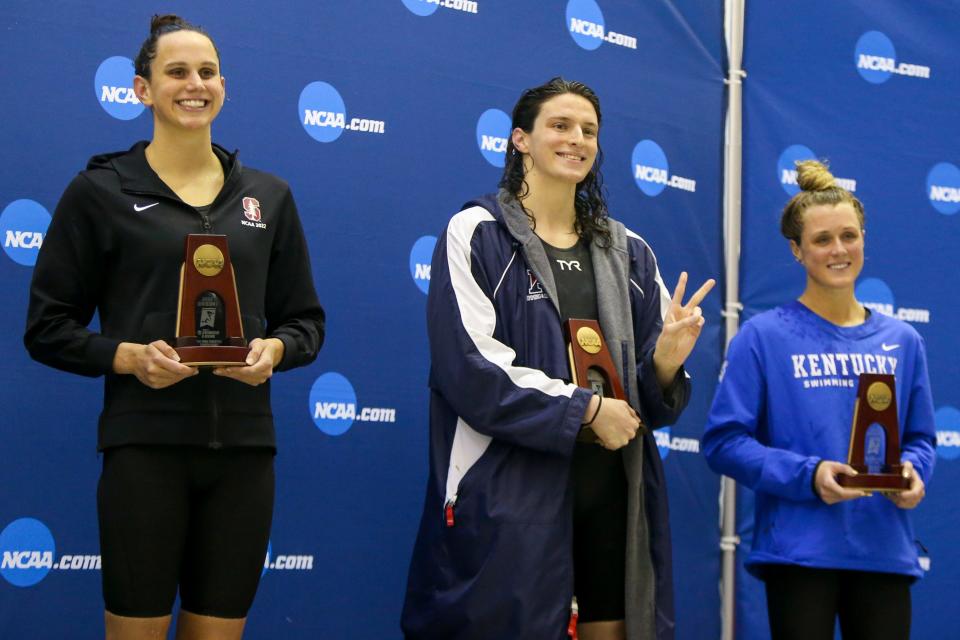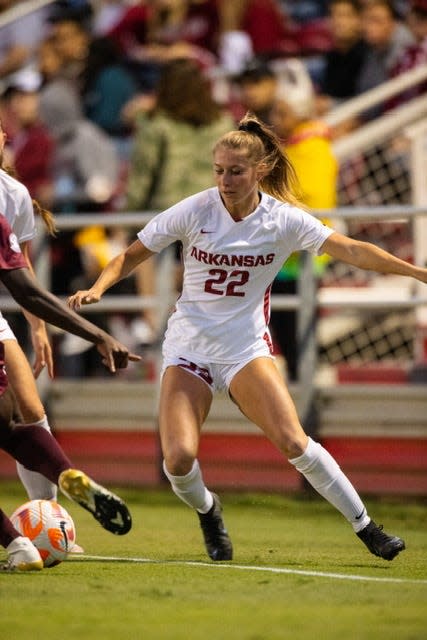These women say transgender rules discriminate against them. So they're suing the NCAA.
- Oops!Something went wrong.Please try again later.
It’s been two years, but the pain Reka Gyorgy says she felt that day is still close to the surface.
Gyorgy, who grew up in Hungary, was in her final year of swimming at Virginia Tech and this was her final event.
At the 2022 NCAA championships, the All-American athlete had hoped to make it to the final round in the 500-yard freestyle event. But she missed the cutoff by one spot – a spot taken by University of Pennsylvania swimmer Lia Thomas.
Thomas, a transgender woman who previously swam on the men’s team at Penn, ended up winning the championship in that event, becoming the first transgender swimmer to earn a Division I title.
For Gyorgy, it was crushing to have her collegiate swim career end this way. And she felt it was unfair.
“I was shocked,” she told me. “All the feelings went through me that this is my last competition before I stopped swimming. It was the end of my career, and knowing that because of Thomas in the field, I won't be able to have a second chance to perform again. It's really upsetting.”
To express her frustration, Gyorgy wrote an open letter to the NCAA shortly thereafter pleading with the organization to change its rules. She never heard back.
Gyorgy still wants to see change. And she’s not alone. She and 15 other female athletes this month filed a lawsuit against the NCAA, arguing its rules for transgender athletes violate Title IX’s ban on sex-based discrimination as well as the 14th Amendment.

The lawsuit, organized by the Independent Council on Women’s Sports, has the potential to have a sweeping impact, as the NCAA sets the rules for its 1,100 member colleges and universities. The suit also names Georgia Tech, which hosted the 2022 swim championships.
“I think the NCAA has demonstrated that it’s lost sight of its reason for being, and it either needs to reform immediately or it needs to get out of the business of regulating college athletics,” Bill Bock, attorney for the plaintiffs, told me.
Coach stood up for women in sports. Then faced public shaming from her college.
'NCAA needs to be held accountable'
The name leading the lawsuit has become familiar since the 2022 championship that Thomas dominated: Riley Gaines.

Gaines, who swam for the University of Kentucky, also competed against Thomas in 2022, and they ended up tying in one event. It never seemed right to Gaines that she and other swimmers were forced to compete with Thomas, who had clear advantages in size and strength.
Since that time, Gaines has attracted a large following on social media (nearly a million on X, formerly Twitter) and speaks frequently around the country on women’s rights in sports. She also hosts a podcast for OutKick on the topic.
Free speech under attack: 'Triggered' students mob athlete who spoke about women's sports
Much like Gyorgy, Gaines said she believes the “NCAA needs to be held accountable.” She was tired of waiting for someone else to do something.
“Why not me?” Gaines told me she remembers thinking.
The federal lawsuit demands that the NCAA change its rules and prevent those assigned male at birth from competing against female athletes. It also wants the NCAA to “reassign and revise” awards given to transgender athletes in women’s events to the female competitors. And it seeks damages for “pain and suffering, mental and emotional distress, suffering and anxiety, expenses costs and other damages" due to defendants’ "wrongful conduct.”
That’s not all. In addition to citing unfairness in the competitions, which falls under Title IX, the lawsuit argues that the NCAA violated the plaintiffs’ 14 Amendment rights by “destroying female safe spaces in women’s locker rooms by authorizing naked men possessing full male genitalia to disrobe in front of non-consenting college women.”
Several of the plaintiffs had that experience with Thomas and felt blindsided by it.

Looking out for future athletes
While much of the lawsuit focuses on Thomas, it isn’t just about past grievances. It’s also about protecting current and future athletes.
Opinion alerts: Get columns from your favorite columnists + expert analysis on top issues, delivered straight to your device through the USA TODAY app. Don't have the app? Download it for free from your app store.
That’s why Ainsley Erzen wanted to get involved as a plaintiff. She’s a sophomore at the University of Arkansas and is a member of both the soccer and track and field teams. She hasn’t yet faced a transgender competitor, but she’d rather not wait for it to happen to her or one of her teammates.
“I think it’s definitely something that I want to get ahead of,” Erzen said. “I don’t think you should have to be personally harmed before you’re justified in speaking out.”

This lawsuit comes at a time when the Biden administration is poised to release its revamped Title IX rules, which are expected to fundamentally overhaul the meaning of “sex” in the law by broadening the definition to include gender identity. At the same time, the administration seeks changes to its policy governing who should be allowed to play on athletic teams – the issue at the heart of the NCAA lawsuit.
“It’s the most anti-woman thing we have seen this administration do,” Gaines said. “It goes against everything this lawsuit is fighting for.”
Title IX changes: Would adding gender identity to Title IX be a game changer? Some say yes, and not in a good way.
There are groups ready to file lawsuits against Biden’s Title IX rewrite, whenever it is released (it’s been delayed multiple times already).
In the meantime, the plaintiffs in the NCAA suit seek to make their voices heard.
As Gyorgy said: “If we don't do something about it right now, nobody's going to, and they just keep discriminating against female athletes.”
Ingrid Jacques is a columnist at USA TODAY. Contact her at ijacques@usatoday.com or on X, formerly Twitter: @Ingrid_Jacques
You can read diverse opinions from our Board of Contributors and other writers on the Opinion front page, on Twitter @usatodayopinion and in our daily Opinion newsletter.
This article originally appeared on USA TODAY: NCAA rules on trans athletes are unfair. So these women are suing

